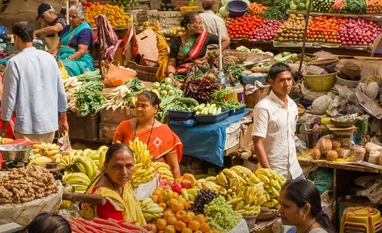Embedding food systems into policy: How cities can restore ecosystems
By embedding food systems into urban governance, cities can influence local food environments and broader supply chains, paving the way for a more resilient and sustainable system
)
Representational Image
Listen to This Article
The urgent need to transform global food systems, responsible for nearly a third of greenhouse gas emissions, was in the spotlight once again at COP29. Cities, as centres of consumption, innovation, and governance, are pivotal in this transformation. COP28 and COP29 emphasised four critical goals- halving food waste, improving food environments to offer healthy and sustainable diets, transitioning to regenerative food production, and conserving and restoring ecosystems. Urban consumption directly drives the first two goals, while city policies and demand patterns significantly shape the latter.
Traditionally, food system discussions have focused on rural production, assuming that producing healthier, more sustainable food would automatically shift consumer behaviour. However, this “farm-to-fork” perspective overlooks a critical reality- consumer demand dictates what farms produce.
To truly address food system challenges, a “fork-to-farm” approach is essential, focusing on changing consumption patterns to influence production practices. Cities, as hubs of consumption, are uniquely positioned to drive this shift, aligning food systems with health and environmental goals while addressing issues like waste and sustainability.
Cities at the heart of food transformation
Cities are where consumption and innovation meet policy and governance, making them central to food system transformation. With over half of the global population already living in urban areas, projected to rise to 68 per cent by 2050, cities will soon consume 80 per cent of the world’s food.
Also Read
This concentration of demand creates opportunities to reduce waste, improve dietary habits, and promote sustainable practices. By embedding food systems into urban governance, cities can influence local food environments and broader supply chains, paving the way for a more resilient and sustainable system.
The urban food challenge
Despite their pivotal role in consumption, cities often treat food systems as secondary to urban governance priorities like traffic management, water supply, sanitation, and public health. While these areas overlap with food systems, they rarely address broader challenges such as equitable access to nutritious food, food safety, waste management, or urban farming. This disjointed approach leaves critical gaps, stalling progress toward inclusive and sustainable urban food systems.
Cities must reimagine food systems as integral to their development agendas, linking them to public health, sustainability, and economic resilience. By doing so, they can address current gaps and create a foundation for inclusive urban food policies.
Street vendors as catalysts for change
Street vendors are essential to urban life and livelihoods of urban poor. Nearly two-thirds of them sell food, ranging from fresh produce to prepared meals, making them a critical link in the urban food chain. They provide fresh, affordable, and culturally rich food to millions. They often operate under challenging conditions, lacking access to potable water, sanitation facilities, waste management systems, and food safety training.
Access to clean water, effective waste management, and hygienic food preparation safeguards consumer safety while supporting food vendors’ livelihoods. Poor sanitation often leads to foodborne illnesses, undermining public trust in local food systems. Cities must invest in infrastructure and facilities to create a clean and healthy food environment. These measures improve public health outcomes and make urban food systems more inclusive and resilient.
Launched in 2020, PM SVANidhi (Pradhan Mantri Street Vendor’s AtmaNirbhar Nidhi) scheme offers collateral-free loans to street vendors, fostering financial inclusion and resilience. Its recent expansion to develop 500 vending hubs across Indian cities addresses critical needs, offering vendors essential resources while creating vibrant public spaces for sustainability, cultural exchange, and community engagement.
Integrating street vendors into the formal economy strengthens their livelihoods while making urban food systems safer and more sustainable. To transform urban food systems, cities must do more and adopt a comprehensive approach.
A clear path forward
Programmes like PM SVANidhi provide a roadmap for supporting vendors and fostering innovation, creating vibrant ecosystems that nourish populations and uplift marginalised workers. However, transforming urban food systems is not merely about infrastructure.
Embedding food system thinking into the city governance frameworks is the key, ensuring policies promote sustainability and inclusivity. Global models like the Milan Urban Food Policy Pact and C40 Good Food Cities demonstrate how cities can lead food system innovation.
Capacity building is crucial for effective urban food governance. Municipal officials need to be sensitised to the complexities of food system issues. A multi-faceted approach is essential, one that includes robust policies and regulations, targeted promotion and advocacy, and strategic investment in infrastructure and facilities. Municipal councils, positioned closest to local challenges, are best placed to lead this effort.
Every city should establish a dedicated food policy council to craft localised policies and develop a comprehensive food charter that reflects community priorities. This framework can guide cities in addressing food governance issues holistically, fostering inclusive, sustainable, and resilient urban food systems.
Infrastructure investments, such as vending hubs and urban farming initiatives, play a critical role by enhancing food security, reducing waste, and reconnecting urban residents with the origins of their food.
Empowering urban food systems is more than a policy priority- it is a moral imperative. Cities must lead efforts to address pressing challenges, ensuring healthy, sustainable, and affordable food for all.
The country urgently needs a robust Urban Food Agenda to guide this journey toward resilient and inclusive urban food systems. With sustained commitment, innovation, and collaboration, the rewards — a healthier population, a thriving economy, and a sustainable planet — are within reach.
(The writer is the CEO, Food Future Foundation. He also served as CEO, FSSAI from 2016-2020)
Disclaimer: These are the personal opinions of the writer. They do not reflect the views of www.business-standard.com or the Business Standard newspaper
More From This Section
Topics : food policymaking COP29
Don't miss the most important news and views of the day. Get them on our Telegram channel
First Published: Dec 17 2024 | 10:04 PM IST

